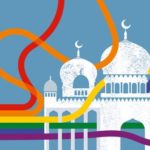Introduction
Both male and female same-sex sexual activity are legal, since 1962, in Slovakia. Predominantly Christian Slovakia (unlike its atheist and liberal neighbor the Czech Republic) is more conservative on issues dealing with lesbian, gay, bisexual, transgender rights. The age of consent was equalized with the heterosexual age of 15 in 1990. An Anti-Discrimination Act was passed in 2004, in line with EU protocols. The Act was broadened in 2008 to make it illegal to discriminate on the basis of sexual orientation in many areas, including employment, education, housing, social care and the provision of goods and services.
Slovakia’s first Gay pride event took place on 22 May 2010 in Bratislava. A crowd of about a thousand was greeted by right-wing groups. While the National and Bratislava’s municipal police forces kept the two sides apart. (photo right: national flag)
Today there is a reasonable gay scene in Slovakia with about ten bars and clubs in Bratislava. A Pew Global Attitudes Project survey recorded that 68% of Slovaks believe that homosexuality should be accepted by society. An additional European Union poll shows 19% of Slovaks support gay marriage. Slowly but surely “Gay Life in Slovakia” is becoming a reality. (Wikipedia LGBT Rights in Slovakia)
Compiled by Richard Ammon
GlobalGayz.com
March 2016
LGBT Life in Slovakia
For a Catholic, conservative and post-Soviet country Slovakia is slowly breaking open the cage of neo-nazi, religious and political anti-gay intolerance that has framed the Slovak culture since its independence from Russia (1989) and from the Czech Republic (1993). Today there is optimism for a LGBT future with numerous organizations, venues and gay life guides easy available.
Searching for resources in Slovakia is a satisfying experience in understanding the diversity and courage of the activists here. Against a general homophobic society that resists liberation and equality (church, neo-nazis, right wing politicians) there is a very determined new-age-thinking generation that dares to challenge homophobia and intolerance.
Supported by EU codes of anti-discrimination as well as international funding these activists continue to push for legislation as well as celebration in the streets. There are now more than a dozen groups and organizations that are pushing the envelop of human rights progress. Here are the most active ones:
Groups: Ganymedes; Altera Lesbian Organization; Queer Leaders Forum; First Lesbian Association Museion; Aspekt LGBT Group.
Information: Bratislavaguide.com; Gay Info; Gay Europe Slovakia.
Venues: Club Sauna; Expert; Apollon Gay Club; Gay Hotel Nova Pension; Club Marseille; Be Happy Club.
(1) Ganymedes
Movement for the equality of gay people in Slovakia.
We are the oldest organization advocating the rights of LGBT minority in Slovakia. As a civic association we registered in 1990 with the Ministry of Interior.
 Altera is a civic association for lesbian and bisexual women, established in 1998. The initial aim was to provide lesbian and bisexual women in Slovakia with a space to meet, to lead discussions, to get to know and educate each other.
Altera is a civic association for lesbian and bisexual women, established in 1998. The initial aim was to provide lesbian and bisexual women in Slovakia with a space to meet, to lead discussions, to get to know and educate each other.
Altera regularly organizes cultural, educational, sports activities and events for lesbian and bisexual women, such as Annual Meetings of Lesbian Women, The Witches Coven, Lesbian Video and Film Festival, skiing trips, collectively organised vacations, sports events, discussion evenings, movie screenings, free chatting, The goal is to support lesbian and bisexual women self-acceptance and self-realisation and to form and sustain a community and culture that would create the basis for political struggle for equal rights of lesbian and bisexual women, as is more common in developed Western democracies.
In 2002 Altera together with Ganymedes assisted in a Research on Discrimination of Lesbians, Gay Men and Bisexuals in Slovakia and prepared a report from research available in Slovak and English language.
In 2004 Altera announced competition for best anti-discrimination poster and prepared first lesbian culture festival that took place in September in Bratislava and in Slovakia for first time ever: el be fest. A poster competition also took place at the festival. More history of Altera.
(3) Queer Leaders Forum
Queer Leaders Forum (QLF) is a civic association, established in 2009 from the initiative of the First Lesbian Association Museion by young Slovak LGBTQ activists.
The vision of Queer Leaders Forum is an equal society, in which sexual orientation does not stigmatize, segregate and discriminate against people. A society in which sexual orientation is one of many characteristics of its diverse people and only one of many otherness which does not effect their human and civil rights. By an active claiming of the rights of non-heterosexual people, Queer Leaders Forum (QLF) aims to the complete and absolute–civic, legislative and social–equalization with the major society.
Here is our young activists blog QLF with essays, texts and poetry through which you can have a look into lives of LGBTQ people.
The Struggle Continues for Equality and Respect
Despite the efforts of well-organized the LGBT community, Skovakia is still a battleground between homophobic tradition and progressive future, as in other former Soviet bloc eastern European countries. Here are stories from the front of the Slovakia’s struggle.
(1)
Neonazi Violence Thwarts First Slovak Gay Parade
May 22, 2010
Bratislava
Attacks by Neonazis on Saturday forced authorities to call off what would have been Slovakia’s first-ever gay pride parade in Bratislava. Right-wing extremists attacked the early gathering of gay marchers in a central city square with teargas and assaulted some of the participants verbally and physically. Authorities then called off the planned march through the streets of central Bratislava, fearing further violence as the planned parade route was teeming with Neonazis. Police were worried that they could not guarantee the  marchers’ safety.
marchers’ safety.
Organisers said that despite the parade being thwarted, their festival ‘Rainbow Pride Bratislava 2010’ would continue through into Sunday morning with a series of concerts. Virtually all leading politicians in the largely Catholic country have refrained from showing public approval of the parade ahead of Slovakia’s upcoming parliamentary elections.
Most media in the country also reported positively ahead of the planned march. The organizers had announced the parade was intended ‘not only as an event for gays and lesbians but for all people who support human rights and the idea of an open society.
(2)
U.S.A., Canadian and Other Ambassadors to Slovakia Publicly Support Gay Pride Parade
By Rebecca Millette
June 09, 2011
Bratislava
Twenty prominent ambassadors to Slovakia, including the Canadian, U.S., and many European Union state ambassadors, notably Polish and Hungarian, signed a public endorsement of a homosexual pride parade that took place this week. The Duhovy or “Rainbow” Pride parade took place on June 4 in Bratislava, Slovakia. Participants demanded legalized same-sex “marriage” and the right to adopt children.
Despite the fact that many of the states the ambassadors represent do not support the goals and aims of the demonstration, the 20 ambassadors said they “stand both literally and figuratively with parade participants as they peacefully assemble to stand up for their human rights, and raise awareness of the LGBT community in Slovakia.”
In response, a group of 22 Slovak intellectuals, writers, and former politicians, including former Prime Minister of Slovakia, Jan Carnogursky, former Interior Minister, Vladimir Palko, and former Slovak Ambassador to Canada, Anton Hykisch, expressed their disappointment with the ambassadors’ stance. They said that any efforts to go further threaten to undermine the family.
Nevertheless, as with all European Union states, Slovakia has adopted protocols on anti-discrimination, including discrimination based on “sexual orientation.”
LGBT Roma (gypsies): Ignored Inside Slovakia
Roma people are a depreciated portion of the Slovak citizenry. The strong prejudice against this subculture–indeed, racism–leaves them marginalized, impoverished and isolated. Within the Roma community, LGBT people are further stigmatized and rejected. It is a harsh life and difficult to break away.
A sad lament posted by the lover of a gay male gypsy:
“My boyfriend, who is 25 and gay, is not out to his family. He is a gypsy too. His mother does not want him to leave home and says that  he can’t leave her alone with his father and the youngest son. I have to be careful what I say about this situation as my fella gets very defensive. He has a huge sense of duty towards his family as most gypsies do. I believe he is also completely terrified of being rejected as his mother has made it clear she does not want to know about any of her sons being gay. My fella’s dad also used to beat him up.
he can’t leave her alone with his father and the youngest son. I have to be careful what I say about this situation as my fella gets very defensive. He has a huge sense of duty towards his family as most gypsies do. I believe he is also completely terrified of being rejected as his mother has made it clear she does not want to know about any of her sons being gay. My fella’s dad also used to beat him up.
“I myself went through a lot for being gay but i am 33 now, and while I am only 8 years older than my fella, it all seems so unfair and utterly stupid that he has to carry this burden….To make matters worse my fella’s younger brother who’s 23 is also gay and has tried to come out but they wont have it. He even moved out and tried living with his boyfriend for a few months but his parents caused so much grief he eventually went home. Both brothers often get very drunk to escape the life they are in. Being gay in the Gypsy world is just not done and is frowned upon…” Read full comment.
A Love Note From a Teen Lesbian
Here is part of a longer love blog posted on Queer Leaders Forum by a teen lesbian thinking about her lover. It speaks to the heart of gay Slovakia:
 “Have you ever loved? I really loved? So that your common random song playing on the radio brings tears to your eyes and you instinctively reach for your mobile and at least look at the photo of her on the “wallpaper”. Your phone so you the desire to call? So much so that knowing she is family love, whatever it is and your family regardless of marital paper? So that you enjoy watching your family albums in Grandma’s smile to see your love you see the same – very bright gold – well, in her cheeks? That in any style you see on the tram yesterday raggedness magical evening? So much so that you will enjoy the extremely embarrassing perfume ads on TV just because you know the narcotic scent of her pillow?” Read more
“Have you ever loved? I really loved? So that your common random song playing on the radio brings tears to your eyes and you instinctively reach for your mobile and at least look at the photo of her on the “wallpaper”. Your phone so you the desire to call? So much so that knowing she is family love, whatever it is and your family regardless of marital paper? So that you enjoy watching your family albums in Grandma’s smile to see your love you see the same – very bright gold – well, in her cheeks? That in any style you see on the tram yesterday raggedness magical evening? So much so that you will enjoy the extremely embarrassing perfume ads on TV just because you know the narcotic scent of her pillow?” Read more
A Contradiction in Conservative Slovakia: Gay Porno ‘Capital’
 Before 1989, censorship was not just of thoughts and opinions critical of the communist regime. There was also censorship of western cultures and their products, including pornography. In the years since, both homosexual and heterosexual adult porno industry has thrived in the Czech and Slovak Republics, despite the latter’s more conservative milieu.
Before 1989, censorship was not just of thoughts and opinions critical of the communist regime. There was also censorship of western cultures and their products, including pornography. In the years since, both homosexual and heterosexual adult porno industry has thrived in the Czech and Slovak Republics, despite the latter’s more conservative milieu.
One of the most famous gay porn companies is the Bel Ami (porno website) film company with offices in Bratislava, Prague and Budapest. It was established in 1993 by filmmaker George Duroy, a Slovak native who took his pseudonym from the protagonist Georges Duroy in Guy de Maupassant’s novel Bel Ami. In addition to hardcore DVDs, Bel Ami also produces calendars and photo books, such as Howard Roffman’s The Boys of Bel Ami (2006), and its performers are frequent headliners at nightclubs and similar venues around Europe, the United States and elsewhere.
 Bel Ami has employed hundreds of actors over its history. Notable performers include Sebastian Bonnet, Kris Evans, Kevin Warhol, Luke Hamill, Tim Hamilton, Josh Elliot, Tommy Hansen, Dolph Lambert, Brandon Manilow, Johan Paulik, Lukas Ridgeston, Ariel Vanean and, more recently, the twins Elijah and Milo Peters, who have performed together in a variety of scenes.
Bel Ami has employed hundreds of actors over its history. Notable performers include Sebastian Bonnet, Kris Evans, Kevin Warhol, Luke Hamill, Tim Hamilton, Josh Elliot, Tommy Hansen, Dolph Lambert, Brandon Manilow, Johan Paulik, Lukas Ridgeston, Ariel Vanean and, more recently, the twins Elijah and Milo Peters, who have performed together in a variety of scenes.
The studio has won numerous adult entertainment awards and nominations. Most recently, Bel Ami earned five 2010 ‘XBIZ’ Awards citations, including LGBT studio of the year, and five nominations at the 2010 GayVN Awards, including best newcomer for Kris Evans. They won the award for best marketing—company image. Company founder George Duroy, as well as marquee performers Lukas Ridgeston and Johan Paulik, have been inducted into the GayVN Awards Hall of Fame. (Wikipedia)
Also see:
Gay Slovakia News & Reports
















